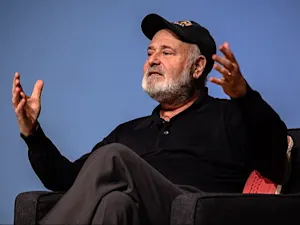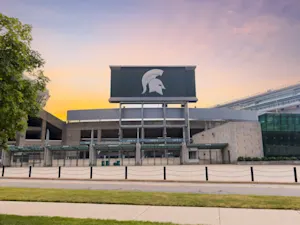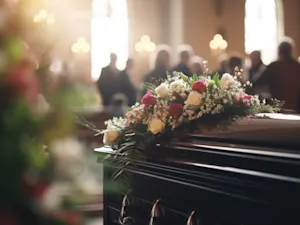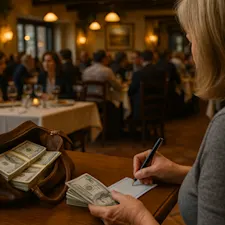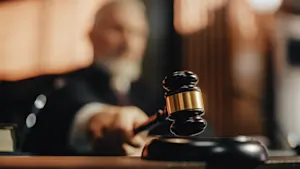
Charles Manson Describes Himself in a Single Sentence
Charles Manson on June 16, 2011. Photo courtesy of California Department of Corrections and Rehabilitation. Public domain.
Charles Manson's name is forever linked with chaos, manipulation, and violence. More than 50 years after orchestrating the gruesome 1969 murders of actress Sharon Tate and six others, his chilling words continue to both horrify and intrigue. With the recent release of "Making Manson," a three-part Peacock docuseries, we gain unprecedented access to more than 20 years of intimate prison recordings. These unfiltered conversations reveal Manson's twisted psyche and leave us questioning how such darkness could take root in one individual.
A Sentence That Speaks Volumes
When asked to describe himself in a single sentence during a 1980s interview, Manson leaned forward, giggled, and replied with his trademark dramatic flair: "I'm nobody. I'm a tramp, a bum, a hobo. I'm a boxcar and jug o' wine. And a straight razor, if you get too close to me," as reported by The Independent.
These words, both cryptic and unnervingly poetic, encapsulate the contradictions of a man who rejected societal norms while leveraging them to manipulate others.
In another chilling excerpt from the tapes featured in "Making Manson," the cult leader openly stated, "I'd murder everybody I could. I'd kill you all if I had the chance," according to Rolling Stone.
This declaration starkly contrasts with his courtroom claim during his infamous 1970 trial that he bore no responsibility for the murders. Instead, Manson blamed society saying, "These children that come at you with knives, they are your children. You taught them; I didn't teach them. I just tried to help them stand up," he said, as reported by The Independent.
The Path to Infamy
Manson's journey from petty criminal to cult leader unfolded in the turbulent 1960s. By targeting vulnerable young women and teens who felt alienated from society, Manson assembled his so-called "Family" at the isolated Spahn Ranch in California. Through manipulation and twisted rhetoric, he convinced his followers to commit unspeakable acts of violence, claiming it was all part of his plan to ignite a race war — what he infamously referred to as "Helter Skelter," inspired by The Beatles.
The Manson Family shocked the world with their sheer brutality with their infamous Tate-LaBianca murders on Aug. 8, 1969. Actress Sharon Tate, age 26 and eight months pregnant at the time, was stabbed 16 times in her secluded Los Angeles home — and an "X" was carved into her belly. The next morning, more victims of the brutal rampage were discovered, including coffee heiress Abigail Folger, celebrity hairstylist Jay Sebring, Polish writer Wojciech Voytek Frykowski, and 18-year-old delivery boy Steven Parent. The following night, grocery store owner Leno LaBianca and his wife Rosemary suffered similarly grisly fates, with the word "war" carved into Leno's abdomen.
Manson himself did not wield a weapon during these killings, but his influence ensured his legal culpability. "I never said I was innocent," Manson said in the docuseries, according to PEOPLE. "I said I didn't break the law."
Insights From the Docuseries
Directed by Billie Mintz, "Making Manson" compiles more than 100 hours of never-before-heard recordings to explore the mind of one of America's most notorious criminals. In one particularly unnerving excerpt shared by PEOPLE, Manson recounts, "I left some dead people on the beach. One woman's not enough for a man." These candid admissions paint a portrait of a man deeply immersed in his own delusions and unchecked rage.
The series also revisits Manson's turbulent upbringing, marked by repeated incarcerations and an early exposure to violence. Interviews with former Manson Family members provide a harrowing glimpse into the cult's inner workings, with many recounting how they would "do anything for Charlie," according to PEOPLE.
Grappling With Legacy
Manson died of natural causes in 2017 at the age of 83, leaving behind a legacy of horror that continues to haunt the public consciousness. For the victims' families, his death brought no closure — only a reminder of lives stolen too soon. The ongoing fascination with Manson raises difficult questions about the allure of evil and society's role in creating figures like him.
Released in November 2024, "Making Manson" offers viewers not just a look at the man himself, but an opportunity to reflect on the ripple effects of his crimes. The documentary underscores the need to honor the victims and learn from history, ensuring that such atrocities are never repeated.
References: Prison Conversations Go Inside Charles Manson's Twisted Mind in Upcoming Peacock Docuseries | 'Making Manson' Documentary Unearths New Tapes With the Late Serial Killer | Charles Manson: What happened when a journalist asked notorious serial killer to describe himself in one sentence















